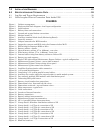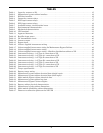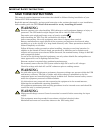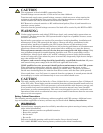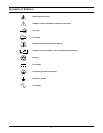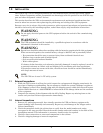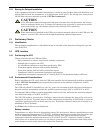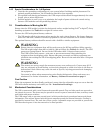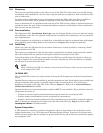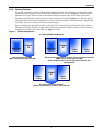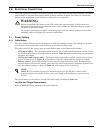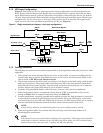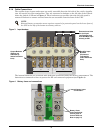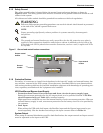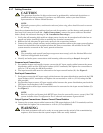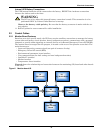
Installation
7
1.6.1 Clearances
There are no ventilation grilles on the sides or rear of the UPS. The sides must be accessible during
installation. After installation, the unit may be placed with the rear against a wall and optional cabi-
nets on either side.
To enable routine tightening of power terminations within the UPS, make sure there is sufficient
clearance in front of the NX to permit free passage of personnel with the door fully opened.
Leave a minimum of 2 ft. (610mm) between the top of the UPS and the ceiling to permit adequate air
circulation above the unit. Liebert recommends against using air conditioning or other systems that
blow air onto the top of the unit.
1.6.2 Floor Installation
The diagrams in 7.0 - Installation Drawings show the location of holes in the base plate for bolting
the equipment to the floor. An optional anchoring kit is available. For information, see your local Lie-
bert representative.
If the equipment is to be placed on a raised floor, it should be mounted on a pedestal that will support
the equipment point loading. Refer to the bottom view in Figure 28 to design this pedestal.
1.6.3 Cable Entry
Cables can enter the NX from the top or bottom. Cable entry is made possible by removing a metal
plate attached to the UPS.
These plates are designed to allow the personnel to punch holes for fitting and securing the conduit.
Once the conduit holes are punched, these plates should be reattached to the UPS.
Connecting cables to the NX may require that the UPS be accessible from the left side to allow per-
sonnel to complete the connections and make necessary adjustments. After installation is complete,
the NX may be serviced from the front.
10-30kVA UPS
The 10-30kVA NX consists of a single cabinet housing the UPS components and the internal battery
string.
Optional battery cabinets are available to provide extended run time. Each cabinet houses additional
strings of batteries that operate in parallel with the NX’s internal batteries. The cabinets are
designed to be bolted to the right side of the UPS (see Figure 1). Refer to 3.4 - External Battery
Cabinet Installation for details.
Optional maintenance bypass/transformer cabinets (MBC-T) are available. These cabinets house the
components necessary to:
• Provide an external wrap-around maintenance bypass switch for servicing the UPS
• Provide voltage transformation for site or application requirements
• Provide a means for neutral isolation and allow installations for site without a neutral conductor
MBC-T cabinets are designed to be bolted to the left side of the UPS (see Figure 1). Refer to 4.5 -
Locating the Cabinet, for further details.
System Composition
A UPS system can comprise a number of equipment cabinets, depending on the individual system
design requirements—e.g., UPS cabinet and External Bypass cabinet. In general, all cabinets used
will be the same height and are designed to be positioned side-by-side to form an aesthetically appeal-
ing equipment suite.
NOTE
When installing the UPS, the customer must provide a disconnect with overcurrent protection
at the output of the UPS.



